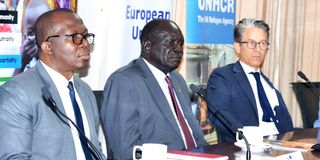EU commits Shs78b for refugee response

Left to Right: UNHCR Country Representative Mathew Crentsil, Minister for Relief, Disaster Preparedness and Refugees Hilary Onek and European Union Ambassador to Uganda Jan Sadek during the partnership signing ceremony in Kampala on Friday. PHOTO/SYLIVIA KATUSHABE
What you need to know:
This comes at a time when Uganda is grappling with funding for refugees in the country.
The European Union (EU) has committed Shs78.2b towards better refugee response in the country.
While signing the three-year partnership with United Nations High Commission for Refugees (UNHCR) in Kampala on Friday, the EU Ambassador to Uganda, Mr Jan Sadek, said the partnership is aimed at making Uganda’s refugee response more sustainable.
He noted that for this year, the EU has allocated €6.5m (about Shs26b) for the programmatic partnership and a total of €19.5m (about Shs78.2b) from 2023 to 2025.
“The three-year programmatic plan will allow our partners to have predictability in their funding and it enforces the possibility to make the Ugandan world model for refugee’s response more sustainable,” Mr Sadek said.
He revealed that the partnership is the first of its kind to be undertaken between the EU and UNHCR and also the first at the moment for a single country.
The partnership will be implemented by the EU’s Humanitarian Directorate-General for European Civil Protection and Humanitarian Aid Operations (DG ECHO) and UNHCR.
“This contract is also fully aligned to the critical priorities that the Ugandan government is expected to announce at the Global Refugees Forum in December. It is aligned to pledges in climate change, transition and localization,” Mr Sadek said.
The funding will support Uganda’ refugee response plan for preserving asylum space, lifesaving aid, co-existence and refugee self-reliance, transition facilities to government management.
Others are to empower local responders, including refugee-led organisations and enhance climate change and natural resource management in the refugee hosting areas.
Mr Sadek applauded Uganda for its open door policy that allows refugees to access protection, health, education services as well as work and create business.
This commitment comes at a time when Uganda is grappling with funding for refugees in the country because of the decreased financial support from the international community.
Speaking at the same event, Mr Mathew Crentsil, the UNHCR representative in Uganda, described the partnership as great news since it makes funding predictable and is also in line with what the government and UNHCR aspire to do and have been doing for years.
Mr Hilary Onek, the minister for Relief, Disaster Preparedness and Refugees, applauded the EU for the partnership, saying it will give fresh air to UNHCR in their services.
However, he stated that there is a need for a durable solution to refugee challenges such as enabling peace in the neighbouring countries.
“We need a durable solution for refugee challenges because sometimes, the refugees we are hosting here are not necessary, in my view, some are economic migrants,” Mr Onek said.
The same minister, while appearing before Parliament’s Presidential Affairs Committee last Thursday, revealed that the government intends to borrow Shs1.0 trillion ($280M) from the World Bank to support refugees in the country.
According to UNHCR, Uganda hosts about 1.5 million refugees. Of these, 52 percent are female and 48 percent are male.
Background
Speaking at the inauguration of the Refugees Appeal Board in September, The Minister for Relief and Disaster Preparedness Mr Hilary Onek said life is getting harder for refugees in settlements and have become a threat to host communities. Mr Onek explained that the recent cut in food aid to Uganda by the WFP has greatly affected the livelihood of refugees in the country, which has forced them to start engaging in criminality.




